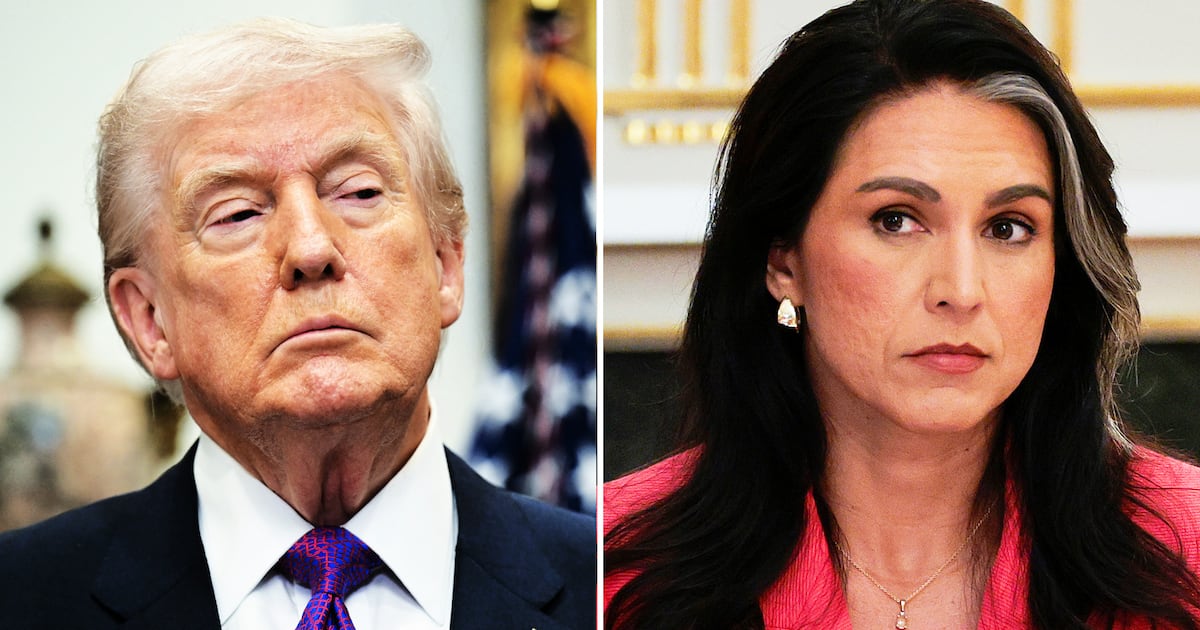Just days after signaling his support for unprecedented levels of U.S. defense spending, Sen. James Inhofe (R-OK), the chairman of the Senate Armed Services Committee, reported purchasing tens of thousands of dollars of stock in one of the nation’s top defense contractors.
After The Daily Beast asked about the purchase, Inhofe’s office said the senator had contacted his financial adviser to cancel the transaction and instructed him to avoid defense and aerospace purchases going forward.
Inhofe, who took over the top spot on Armed Services after the death of Sen. John McCain (R-AZ) in August, has repeatedly pressed President Donald Trump to dramatically scale up the Pentagon’s annual budget, which currently stands at $717 billion. Last week, after Trump hinted he would like to scale back parts of that budget, Inhofe met with the president and Defense Secretary James Mattis, after which it was announced that the administration would seek even more defense funding: a record $750 billion in spending for fiscal year 2020.
News of that budget request broke on Sunday. On Tuesday, Inhofe’s financial adviser bought him between $50,000 and $100,000 in stock in defense contractor Raytheon, according to documents filed with Senate ethics officials.
Federal lawmakers are prohibited from trading stock based on non-public information. But since news of Trump’s massive Pentagon budget request was already public when Inhofe purchased the stock, it likely would not have run afoul of congressional insider trading laws even if Inhofe himself were behind the transaction.
But the Raytheon stock purchase still raised a flag for government ethicists, who said it underscored the moral hazard of lawmakers owning assets in areas of industry affected by legislation they are in positions to author and shepherd into law. No federal rule or regulation would prohibit Inhofe’s investment adviser, or any other, from trading stocks based on the actions of their congressional clients, even without direct input from those clients. Nor is Inhofe prevented from seeing what stocks are in his portfolio. The latest stock purchases were posted publicly on a Senate database.
“We have no way of knowing what kind of relationship Inhofe has with whoever is managing his money/trust and it's wild to take it on good faith that he has some kind of puritanical self-imposed barrier in place that prevents him from communicating in any way with his broker about his trades,” Alex Baumgart, a researcher at the Center for Responsive Politics, wrote in an email.
On Wednesday afternoon, the senator’s office said that he had been unaware of the stock purchase until that day.
“All of Senator Inhofe’s financial transactions are handled by a third-party advisor,” wrote spokesperson Leacy Burke in an email. “The senator has had no involvement in and has not been consulted about his stock transactions.”
“[T]he Senator has called his financial advisor and they reversed, or busted, the transaction,” Burke added. “This means that the transaction was canceled before it was settled; the Senator never took ownership of it.”
Burke said that a new transaction report had already been filed with Senate ethics officials reflecting that cancellation, though as of 5 p.m. EDT on Wednesday evening no such filing was publicly listed on the disclosure website.
Additionally, Burke said that Inhofe had directed his financial advisor not to purchase any aerospace or defense stocks going forward. Burke provided a letter from Inhofe dated Wednesday detailing those instructions. Metadata in the document indicates that it was created less than 20 minutes after The Daily Beast first reached out for comment.

Last year, Inhofe, through his financial adviser, bought stock in another Pentagon contractor, Fluor, according to Senate disclosure records. But he sold that stock in August, shortly before assuming the Armed Services Committee chairmanship.
Inhofe has purchased or owned stock in other companies within his direct legislative purview in the past. From 2015 to 2017, he chaired the Senate Environment and Public Works Committee. At the time, he owned stakes in energy companies including Continental Resources and Newfield Exploration. Like his shares in Raytheon, those assets were held in the trust managed by his financial adviser.
But the Raytheon purchase, coming right as Inhofe pushed a massive defense funding bill, raised eyebrows among ethics experts who noted that he was in position to advocate and advanced legislation that would directly impact the company’s bottom line.
“The requested defense budget increase was no longer ‘nonpublic’ because it had already been publicized,” said Brendan Fischer, the director of federal reform programs at the Campaign Legal Center. “But Inhofe likely has other nonpublic inside information, such as insight into what the final budget will look like and which industries stand to benefit.”
Inhofe is likely to retain his perch atop the Armed Services Committee when the next Congress reconvenes in the New Year. Under Republican rules, party members on a specific committee get to vote for who should serve as their committee’s respective chair. Though it is not required, members often decide such matters on basis of seniority, giving the Oklahoma Republican a clear leg up and positioning him to have heavy sway over both defense policy and defense budgeting during the next few years.
For more investigative content like this, sign up for PAY DIRT, Lachlan Markay’s weekly newsletter on corruption, campaign finance, and money in politics.






